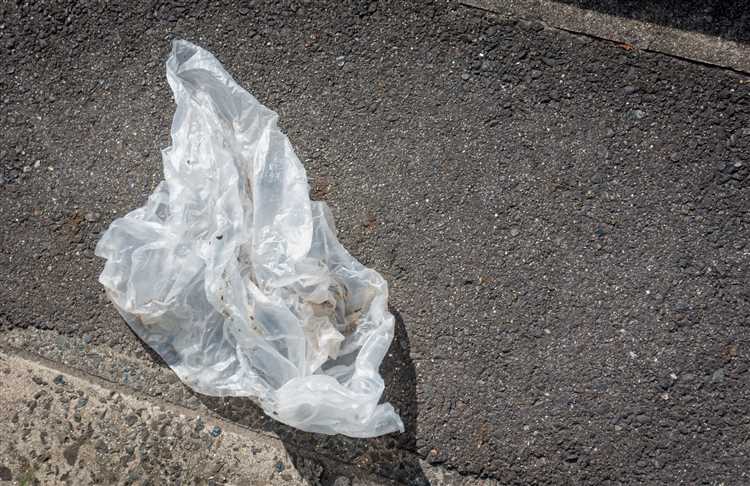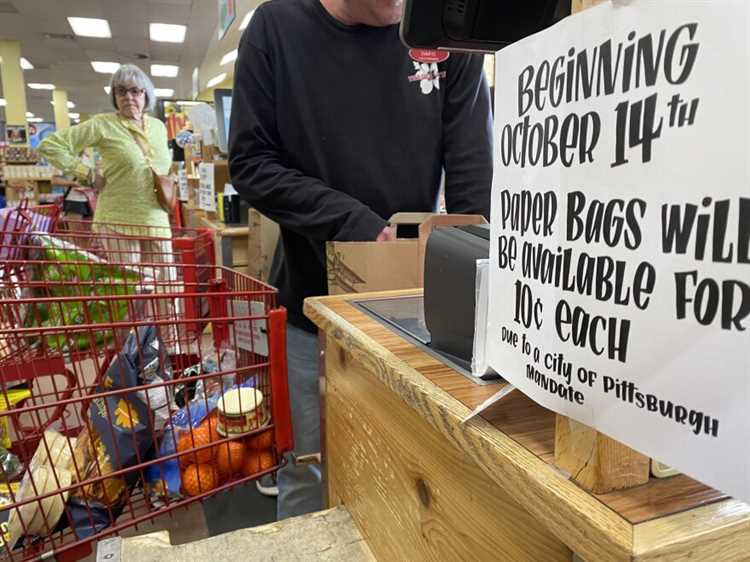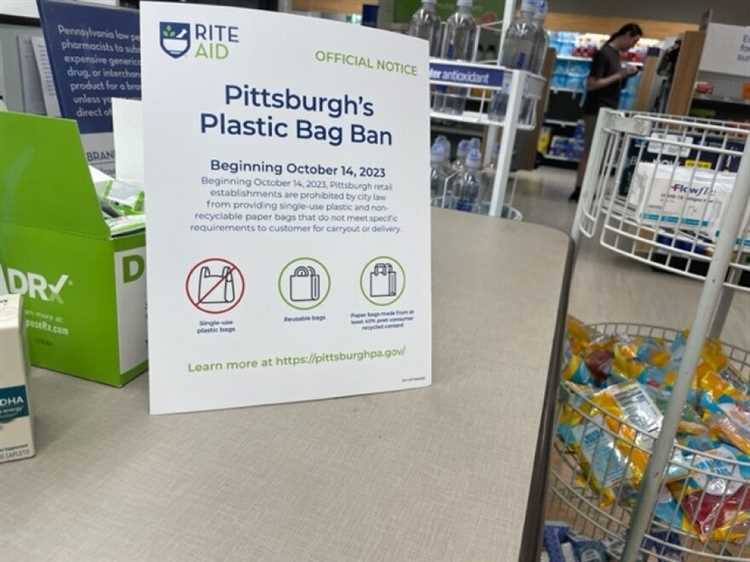
Attention, Pennsylvania shoppers! A new law has been passed banning the use of plastic grocery bags in the state, and it will soon be going into effect. This is a major step towards reducing plastic waste and protecting our environment.
Starting from [date], all grocery stores, supermarkets, and other retail establishments will be required by law to eliminate the use of plastic bags at checkout counters. Instead, shoppers will be encouraged to bring their own reusable bags or opt for paper bags, which are more environmentally friendly.
This ban comes as a response to the growing concern over the negative impact of plastic bags on our planet. Plastic bags are not biodegradable and can take hundreds of years to decompose. They often end up in rivers, oceans, and landfills, posing a threat to wildlife and contributing to pollution.
But don’t worry, Pennsylvania shoppers! There are plenty of alternative options available to help you make the transition away from plastic bags. Many stores will be offering reusable bags for sale at affordable prices, and some may even provide incentives for customers who bring their own bags.
It’s time for all of us to take responsibility for our actions and make small changes that can have a big impact. By saying goodbye to plastic grocery bags, we are taking a step towards a cleaner, greener future for Pennsylvania and the planet as a whole.
- Overview of the Plastic Grocery Bags Ban in Pennsylvania
- Implications for Shoppers and Retailers
- Benefits of the Plastic Grocery Bags Ban
- 1. Conservation of Natural Resources
- 2. Reduction in Waste
- 3. Protection of Wildlife
- 4. Promotion of Reusable Alternatives
- 5. Economic Opportunities
- Alternative Solutions for Carrying Groceries
- Reusable Bags
- Paper Bags
- Basket or Cart
- Environmental Impact of Plastic Grocery Bags
- Legal Requirements and Penalties
- Question-answer:
- Why is there a ban on plastic grocery bags in Pennsylvania?
- When did the ban on plastic grocery bags in Pennsylvania go into effect?
- Are there any exceptions to the ban on plastic grocery bags in Pennsylvania?
- What are the alternatives to plastic grocery bags in Pennsylvania?
- What are the penalties for violating the plastic grocery bags ban in Pennsylvania?
Overview of the Plastic Grocery Bags Ban in Pennsylvania
The Plastic Grocery Bags Ban in Pennsylvania refers to the statewide legislation that aims to reduce the usage of single-use plastic bags in retail establishments, specifically grocery stores. This ban is an effort to address the environmental impact of plastic bags, such as their contribution to pollution, litter, and harm to wildlife.
Starting on July 1, 2021, Pennsylvania will prohibit the distribution of single-use plastic bags in most retail stores, including grocery stores, supermarkets, convenience stores, and pharmacies. However, there are exceptions to this ban. Some businesses may be exempted if they meet certain criteria, such as employing fewer than ten people or if the plastic bags are used for specific purposes, such as packaging bulk items or meats.
Instead of plastic bags, the ban encourages the use of reusable bags made of materials like fabric, paper, or other durable materials. Retailers are encouraged to provide reusable bags for purchase, offer incentives for customers who bring their own bags, or provide alternative options for carrying purchases, such as cardboard boxes.
It is important for consumers to be aware of the ban and its implications. By encouraging the use of reusable bags, Pennsylvania aims to reduce the amount of plastic waste that ends up in landfills or as litter in the environment. This ban is an opportunity for individuals to make a positive impact on the environment and promote sustainable practices.
Violations of the plastic bags ban can result in penalties and fines for retailers who fail to comply with the legislation. It is crucial for businesses to understand and adhere to the ban in order to avoid legal consequences.
Overall, the Plastic Grocery Bags Ban in Pennsylvania is a significant step towards reducing plastic waste and promoting eco-friendly practices in the state. By encouraging the use of reusable bags, Pennsylvania aims to create a cleaner and more sustainable environment for future generations.
Implications for Shoppers and Retailers
The plastic grocery bag ban in Pennsylvania has several implications for both shoppers and retailers. Here are some key points to consider:
1. Changing Shopping Habits: Shoppers will need to adjust their habits and bring reusable bags or opt for alternative options such as paper bags. This shift may require some time to get used to, but it is a necessary step towards reducing plastic waste and protecting the environment.
2. Increased Demand for Reusable Bags: With the ban in place, there will likely be an increased demand for reusable bags. Retailers may need to stock up on these bags and promote their use by offering incentives or discounts to encourage shoppers to bring their own bags.
3. Potential Increase in Costs: Retailers might face additional costs associated with phasing out plastic bags and transitioning to alternative options. These costs could include purchasing reusable bags, training staff on new procedures, or implementing new bagging systems. However, in the long run, these changes could lead to cost savings and improved sustainability.
4. Environmental Benefits: The ban on plastic grocery bags aims to reduce the negative impact of plastic waste on the environment. By using alternative options, shoppers and retailers can contribute to reducing pollution, protecting wildlife, and preserving natural resources.
5. Enforcement and Compliance: Retailers will need to ensure compliance with the ban by following the guidelines set by the state. This may involve training employees on the new regulations and monitoring the use of plastic bags at checkout. Shoppers will also need to adapt and be mindful of the ban to avoid any potential penalties or fines.
6. Supporting Local Businesses: The ban presents an opportunity for retailers to support local businesses that provide alternative packaging options. This could include sourcing paper bags from local suppliers or partnering with manufacturers of reusable bags within the state.
Overall, the plastic grocery bag ban in Pennsylvania will require adjustments from both shoppers and retailers. However, the long-term benefits of reducing plastic waste and protecting the environment make this transition worthwhile. By embracing alternative options and making sustainable choices, shoppers and retailers can contribute to a cleaner and greener Pennsylvania.
Benefits of the Plastic Grocery Bags Ban

There are numerous benefits to implementing a ban on plastic grocery bags in Pennsylvania. This environmentally friendly policy aims to reduce the negative impact of plastic bags on our communities and ecosystems. Here are some of the key benefits:
1. Conservation of Natural Resources
The production of plastic bags requires the extraction and processing of fossil fuels, contributing to carbon emissions and depleting our finite resources. By banning plastic grocery bags, we can reduce our reliance on these resources and promote a more sustainable future.
2. Reduction in Waste
Plastic bags are notorious for their long lifespan and non-biodegradable nature. They can take hundreds of years to decompose, filling up landfills and polluting our oceans and waterways. Implementing a ban on plastic grocery bags will help reduce waste and prevent further environmental pollution.
3. Protection of Wildlife
Plastic bags pose a significant threat to wildlife, both on land and in the water. Many animals mistake plastic bags for food, leading to ingestion and entanglement, which can be fatal. By eliminating plastic grocery bags, we can help protect our diverse ecosystems and the animals that inhabit them.
4. Promotion of Reusable Alternatives
The ban on plastic grocery bags encourages the use of reusable alternatives, such as cloth bags, paper bags, or durable plastic bags. These options are more sustainable and can be used multiple times, reducing the overall demand for single-use plastics and promoting a culture of reuse.
5. Economic Opportunities
Implementing a plastic grocery bags ban can also create economic opportunities. It encourages the production and use of alternative materials, creating jobs in industries that produce reusable bags and other sustainable packaging solutions. This can stimulate local economies and promote innovation in the packaging industry.
Overall, the plastic grocery bags ban in Pennsylvania brings a multitude of benefits, from conserving natural resources to protecting wildlife and promoting sustainable practices. It is a crucial step towards creating a cleaner, healthier, and more environmentally conscious future for our state.
Alternative Solutions for Carrying Groceries

With the ban on plastic grocery bags in Pennsylvania, it’s important to explore alternative solutions for carrying groceries. Here are a few options to consider:
Reusable Bags
One of the most popular alternatives to plastic bags is reusable bags. These bags are made from durable materials such as cotton, canvas, or nylon, and can be reused multiple times. They come in various sizes and styles, making it easy to find one that suits your needs. Reusable bags are not only environmentally friendly but can also be stylish and customizable.
Paper Bags
Another option for carrying groceries is paper bags. While not as durable as reusable bags, paper bags are biodegradable and can be easily recycled. Some grocery stores offer paper bags as an alternative to plastic, and they can be a good option if you forget your reusable bags. Just be mindful of their limitations, as they may not hold heavier or wet items as well as plastic or reusable bags.
Tip: If you choose paper bags, try to reuse them whenever possible or recycle them to minimize waste.
Basket or Cart
If you have a small number of groceries or are planning a quick trip to the store, using a basket or cart can be a convenient solution. Baskets are portable and lightweight, making them easy to carry around the store and transport your groceries home. Carts, on the other hand, are larger and can hold more groceries, making them suitable for bigger shopping trips. Some grocery stores provide baskets or carts for customer use.
Tip: Keep a foldable reusable bag or two in your car or purse in case you need an additional way to carry your groceries.
By exploring these alternative solutions for carrying groceries, you can easily adapt to the plastic bag ban in Pennsylvania while also reducing your environmental impact. Remember to choose options that best suit your needs and always strive to minimize waste.
Environmental Impact of Plastic Grocery Bags
Plastic grocery bags have long been a contentious topic when it comes to their impact on the environment. These single-use bags are made from non-biodegradable materials, primarily petroleum-based plastic, which means they can take hundreds of years to break down in the environment. This leads to a range of negative consequences for ecosystems and wildlife.
One of the most significant environmental impacts of plastic grocery bags is their contribution to plastic pollution. When not properly disposed of, these bags can end up in rivers, lakes, and oceans, where they pose a serious threat to marine life. Marine animals may mistake plastic bags for food or become entangled in them, leading to injury and death.
In addition to harming marine life, plastic grocery bags also have an impact on land ecosystems. They can be carried by the wind and litter the landscape, contributing to visual pollution and damaging natural habitats. The production of plastic bags also requires the extraction of non-renewable resources and contributes to greenhouse gas emissions.
To address these environmental concerns, many cities and countries have implemented bans or fees on plastic grocery bags. By encouraging the use of reusable bags or alternative materials, these policies aim to reduce the demand for single-use plastic and promote more sustainable shopping practices.
| Environmental Impact | Solutions |
|---|---|
| Contributes to plastic pollution | Implement bans or fees on plastic bags |
| Threatens marine life | Promote the use of reusable bags |
| Damages land ecosystems | Encourage the use of alternative materials |
| Contributes to greenhouse gas emissions | Reduce demand for single-use plastic |
In conclusion, the environmental impact of plastic grocery bags is significant and multifaceted. By understanding these impacts and making informed choices about our consumption habits, we can work towards a more sustainable future.
Legal Requirements and Penalties
In Pennsylvania, the ban on plastic grocery bags is enforced through legal requirements and penalties. Understanding these rules can help businesses and consumers comply with the ban and avoid fines and other consequences.
Under the ban, businesses are prohibited from providing customers with single-use plastic bags at checkout. Instead, they are encouraged to offer reusable bags or encourage customers to bring their own bags. Customers are also encouraged to opt for reusable bags and reduce their reliance on disposable plastics.
Violations of the ban can result in penalties for both businesses and individuals. Businesses who fail to comply may face fines or other legal consequences. The exact penalties vary depending on the jurisdiction and the severity of the violation.
Additionally, consumers who repeatedly violate the ban may also face penalties. While individuals may not be fined for using plastic bags, they may be subject to warnings or educational campaigns aimed at promoting compliance with the ban.
It is important for businesses and consumers to familiarize themselves with the specific requirements and penalties in their area to ensure they are in compliance with the ban on plastic grocery bags.
Question-answer:
Why is there a ban on plastic grocery bags in Pennsylvania?
The ban on plastic grocery bags in Pennsylvania was implemented to reduce plastic waste and its negative impact on the environment. Plastic bags take hundreds of years to decompose and often end up in landfills or as litter in rivers, oceans, and wildlife habitats.
When did the ban on plastic grocery bags in Pennsylvania go into effect?
The ban on plastic grocery bags in Pennsylvania went into effect on July 1, 2021. Retail establishments are no longer permitted to distribute single-use plastic bags to customers.
Are there any exceptions to the ban on plastic grocery bags in Pennsylvania?
Yes, there are a few exceptions to the ban on plastic grocery bags in Pennsylvania. Small businesses with fewer than 50 full-time employees are exempt from the ban until July 1, 2023. Additionally, plastic bags can still be used for certain purposes such as packaging loose items, containing unwrapped food, or separating different items within a package.
What are the alternatives to plastic grocery bags in Pennsylvania?
There are several alternatives to plastic grocery bags in Pennsylvania. Customers are encouraged to bring their own reusable bags, such as cloth or canvas bags, to the store. Retail establishments may also offer paper bags or thicker, reusable plastic bags for a small fee.
What are the penalties for violating the plastic grocery bags ban in Pennsylvania?
The penalties for violating the plastic grocery bags ban in Pennsylvania vary depending on the municipality. Some areas impose fines ranging from $100 to $600 for each offense. However, many municipalities are focusing on education and outreach to help businesses and individuals comply with the new law.